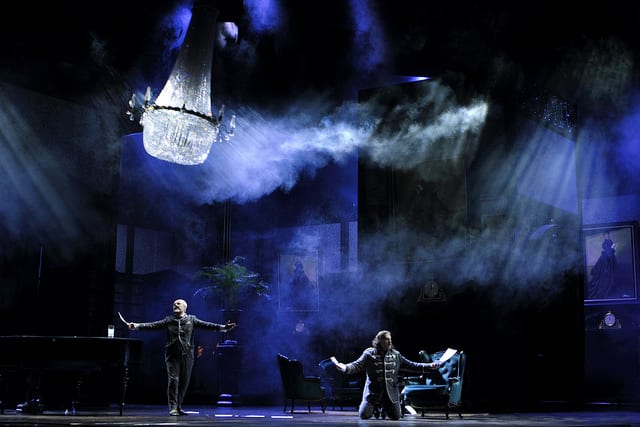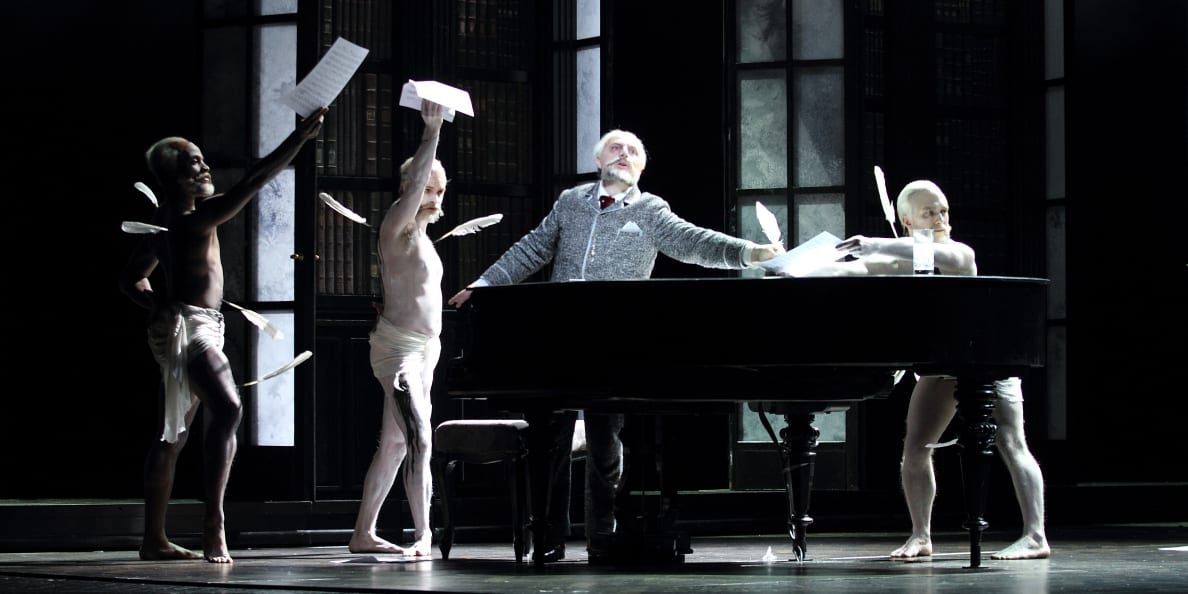‘One could lose one’s sense if music didn’t exist. It’s the most beautiful gift of heaven for a man who errs in the darkness’ writes Tchaikovsky.
The juxtaposition of heavenly music with the tormenting guilt of erring ‘in the darkness’, a euphemism for being homosexual, is at the heart of Stefan Herheim’s direction of Tchaikovsky’s masterpiece, The Queen of Spades. Modest, the composer’s brother, based the libretto on Pushkin’s novella of the same title, but he dramatically altered the ending of the plot.
At the heart of Modest’s libretto, the central character a soldier, Hermann, loves Lisa, who returns his love but is betrothed to Prince Yeletsky. Hermann, obsessed by gambling, learns that Lisa‘s guardian, the old Countess, knows the secret of an infallible winning sequence of three cards. He sneaks into the old lady’s bedroom to extract the secret of the three cards and literally frightens her to death. The Countess’s ghost reveals to him the secret numbers. Liza commits suicide when she realises that he loves cards more than he loves her. Herman gambles all and losses all.
The current production at the Royal Opera House substantially deviates from the original libretto. It is not the period that changes, but the dramatic elements in the libretto that are brought totally out of focus. Herheim seems totally disinterested in dramatizing the main plot and rather centres on the composer’s obsession with the obsessive lead character, Gherman (Hermann). He zooms in on the composer himself, presenting various parallels with the Tchaikovsky’s biography. The composer is on stage throughout the performance often waving his arms as if conducting. There seem an undercurrent struggle between the composer’s feeling of guilt for being homosexual and a sense of redemption offered through the music. At one point Tchaikovsky manifests himself as one of the characters in the libretto, namely the jilted old Prince Yeletsky. It is not coincidental that Tchaikovsky, the man who is torn between his sexual needs (in the opening scene of this production, he is paying a male prostitute/soldier for services). That character turns out to be the leading character, Gherman).

Vladimir Stoyanov, the Bulgarian baritone, is making his Royal Opera House debut, as Prince Yeletsky and as Tchaikovsky. Stoyanov’s rich voice delivers with perfect intensity Prince Yeletsky’s love aria, “Ya vas lyublyu” to Lisa. Stoyanov’s Tchaikovsky is less convincing and in parts rather pathetic. I guess this is the fault of the approach of this production, rather than of the performer.
Unfortunately, Alexanders Antonenko’s performance, in the leading role of Gherman, the obsessive gambler, falls flat both vocally and theatrically. Eva-Maria Westbroek’s Lisa is in part vibrant but she seems to struggle with her high register.
Anya Goryachova is charming, vocally assured and touching as Paulina. The veteran Felicity Palmer insisted on performing her role as the old Countess despite suffering from a cold on the night I attended. She offers a feisty, confident and very elderly Countess, a captivating characterization.
Philipp Fürhofer’s set together with Bernd Purkrabek’s superbly arranged lighting, conjure the dramatic atmosphere that is desperately lacking in the performance itself. The shift from an interior of 1790 with the image of the Empress Catherine the Great over the fireplace is replaced with the interior of the composer’s study in 1890, with a large portrait of the Countess’s image, showing her young and beautiful. A large chandelier, at one point swings from side to side, emitting smoke like an enormous censer. There is much use of symbolic images drawn from Christianity, Mozart’s The Magic Flute, etc.
Last but certainly not least; five stars must be awarded to the most inspired performance of the orchestra under the baton of maestro Pappano. His understanding of Tchaikovsky’s style and orchestration are the main reason to attend this production.

